Problems and prospects for reintegration of returned migrants with disabilities
Read also
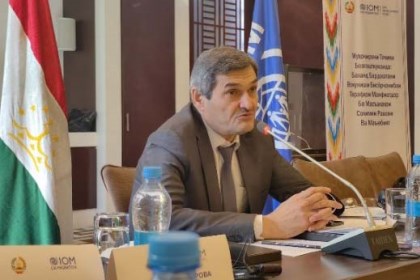
DUSHANBE, 30.10.2023 (NIAT Khovar) – The issues of returned labor migrants with functional limitations and disabilities were discussed during meetings on the results of the International Organization for Migration study conducted under the project “Returned Tajik Migrants: Strengthening a multi-sectorial response to mental health and disability”. The events took place in Bokhtar, Dushanbe, Khujand and Khorog in October 2023. In the course of discussions, important issues of people with physical disabilities were raised.
Kudratullo Kurbonov, Head of the Social Protection Department of the Ministry of Health, spoke about the National Disability Policy, positive experience and lessons learned. He emphasized that social aspects of persons with disabilities and protection of their rights are under special supervision of the President. As full-fledged representatives of civil society, they play an important role in the development of all economic, social, cultural and other spheres of life.
Mr. Kurbonov emphasized that the state’s social policy is focused on guaranteeing the rights of persons with disabilities; monitoring of compliance with the realization of these rights is constantly conducted. To date, more than 100,000 people with disabilities have been registered in Tajikistan. Of these, 17,425 belong to the category I; 78,627 have the category II, and 32,902 have the category III. All of them have the right to receive benefits. The Codes (tax, land, labor, housing, health) and a number of other legal acts contain special provisions and articles that regulate the legal aspects of the life of persons with disabilities. The Ministry of Health and Social Protection is the key ministry responsible for coordinating and implementing the Government policy. There are 220 different institutions and agencies that work with disabled persons.
Despite the efforts of the Government, there are still a number of serious problems for persons with disabilities. One of them is passing a medical and social expert assessment to obtain a disability category.[1]
The expertise is conducted free of charge by district, inter-district or city affiliates of the State Medical and Social Service. In order to undergo an expert assessment, a person with impaired working capacity and life activity limitations must collect and submit the necessary package of documents to the commission. However, it is very difficult to collect these documents for returning labor migrants and citizens living in remote rural areas. The procedure for obtaining an official disability requires compliance with many formalities, which takes time and is accompanied by emotional stress.
The lack of medical facilities and specialists in rural areas is also a serious obstacle. Therefore, it is necessary to travel to the city to undergo medical and administrative procedures, which entails a number of additional difficulties, including geographical accessibility, availability of funds and travel time.
The International Organization for Migration comprehensive study “Disability among returning migrant workers in Tajikistan” recommends simplifying the procedure for obtaining official disability status by reducing bureaucratic delays, extending the extension period for the first and second categories of disability, updating and modifying the criteria for determining disability, including the elimination of hospitalization as a precondition for obtaining status. It is also recommended to switch to the international criteria of the Washington Group.[2] This will address the challenge of defining and developing disability indicators suitable for census, national surveys and the collection of high-quality disability data comparable to international criteria.
Strong family relationships are an important socio-economic and psychological support for returning labor migrants with disabilities. They compensate for the shortcomings of medical and social assistance to persons with disabilities in Tajikistan. However, it should be taken into account that caring for a disabled person places a huge additional economic and emotional burden on family members, especially women. This, in turn, can reinforce existing gender inequalities.
Particular attention was paid to the lack of information of returning labor migrants with disabilities about the rights and regulations for processing state assistance, which leads to situations when persons with disabilities are de facto denied benefits.
“Until today I have received nothing, only my pension. I told the inspector that I would pay 50% for electricity. He said: no, there are no benefits for electricity. I went to the head of the local administration, asked to put me on the list of the indigent. He said he didn’t have time for those formalities. So I asked him three or four times, to no avail, and in the end, I stopped submitting documents”. (male, 44 years old, from Vakhdat, Tajikistan).
Speaking about the reintegration of returned migrants with disabilities, participants emphasized that persons with disabilities need employment, active participation in social life, and psychosocial support. A few years ago, according to Articles 110 and 278 of the tax legislation of the Republic of Tajikistan, tax exemptions were provided for industries employing more than 50% of people with disabilities. Regrettably, in the new edition of the Tax Code these norms are absent.
Assadullo Zikrikhudoev, Head of the National Association of Persons with Disabilities of Tajikistan, says: “We are now working to have the former preferential tax rules returned. We made an official request to the Tax Committee and received a reply saying that not a single entrepreneur had used these benefits in 30 years. However, we assured them that organizations such as societies for the disabled, blind, and deaf had tax preferences. At the moment, both the Tax Committee and the Ministry of Finance are working on this. We hope that preferential tax norms will be restored”.
Tashrivbek Zavkibekov has been working for 44 years in the Branch of the Deaf Society of Gorno-Badakhshan Autonomous Province, where 510 people are currently registered. These are mostly people with congenital disabilities, but there are also those who suffered industrial injuries during their labor migration.
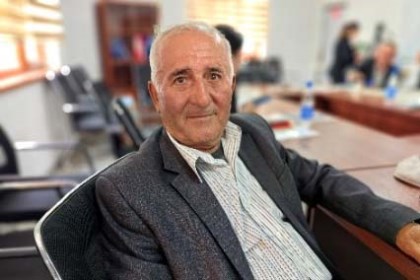
According to him, only a minimal number of those registered are employed, since local employers do not always use their workforce and are not responsible for their safety during the production process.
“We used to have courses in carpentry, shoe and tailoring and other professions, but now there are none due to lack of funding. Therefore, most people with physical disabilities are left without any specialty, and unemployment is increasing. In the town of Khorog there is a confectionery shop run by Mehrinisso Atobekova. Her parents were hearing-impaired citizens; now she helps us and has hired all girls and women with hearing problems. Her business is going well and thanks to the taxes she pays into the pension fund, her employees’ pensions will be increasing.
According to Alla Ivanova, an International Organization for Migration expert and co-author of the comprehensive study “Disability among returning migrant workers in Tajikistan”, it is necessary to develop an information package for returning labor migrants, especially on opportunities and measures for reintegration in the labor market, as well as on how they can receive state assistance, social and medical services. The package should include information specifically designed for returning female migrants, as well as for migrants with disabilities. This information should be disseminated in rural areas through self-help networks, resource centers for migrants, targeted information campaigns, through a helpline (telephone, Internet, social networks) and mobile groups – to assist returning labor migrants with disabilities and their families in legal and administrative procedures.
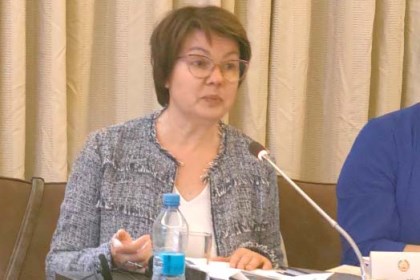
Reintegration of returned migrants with disabilities is a serious challenge not only for the country’s health care and social protection system, but also for society as a whole and the fulfillment of this responsibility is possible through broad cooperation between the Ministry of Labor, Migration and Employment, the Ministry of Foreign Affairs, the Ministry of Finance, as well as civil society institutions and the private sector, as envisaged by the National Development Program of the Republic of Tajikistan for the period until 2030[3] and the National Program for the Rehabilitation of Persons with Disabilities.[4]
[1] Procedure for medical and social expert assessment of April 26, 2022, No. 177 http://www.adlia.tj/show_doc.fwx?Rgn=142027
[2] The Washington Group on Disability Statistics (WG). https://www.washingtongroup-disability.com/
[3] National Development Program of the Republic of Tajikistan for the period up to 2030. Resolution of the Majlisi Namoyandagon Majlisi Oli of the Republic of Tajikistan of December 1, 2016, No. 636 «On Approval of the National Development Strategy of the Republic of Tajikistan for the period up to 2030». — http://www.adlia.tj/show_ext.fwx?ext=1701
[4] National Program for the Rehabilitation of Persons with Disabilities for 2017 — 2020 of October 28, 2016, No. 455. —http://www.adlia.tj/show_doc.fwx?Rgn=127958











 Political Consultations Between the Republic of Tajikistan and the United Kingdom Held in London
Political Consultations Between the Republic of Tajikistan and the United Kingdom Held in London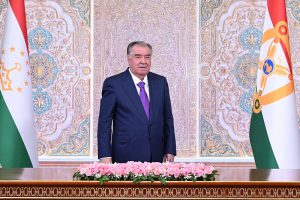 Iranian scholar praises Emomali Rahmon’s Initiative to Distribute “Shahnameh” to Every Tajik Family
Iranian scholar praises Emomali Rahmon’s Initiative to Distribute “Shahnameh” to Every Tajik Family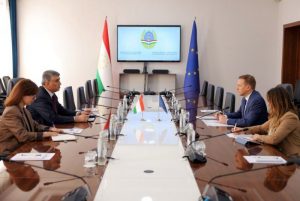 Tajikistan, European Union Discuss Improving Mutual Legal Assistance
Tajikistan, European Union Discuss Improving Mutual Legal Assistance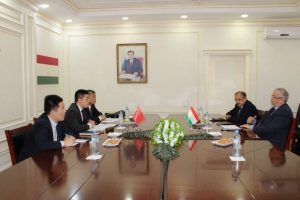 Tajikistan, China Discuss Expanding Strategic, Scientific Cooperation
Tajikistan, China Discuss Expanding Strategic, Scientific Cooperation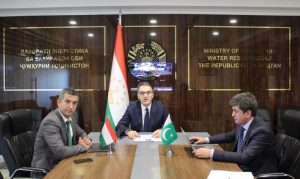 Tajikistan, Pakistan Discuss Energy Cooperation, Plan Joint Commission Meeting
Tajikistan, Pakistan Discuss Energy Cooperation, Plan Joint Commission Meeting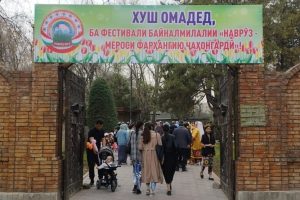 Dushanbe to Host International Navruz Festival Showcasing Tajik Culture and Tourism
Dushanbe to Host International Navruz Festival Showcasing Tajik Culture and Tourism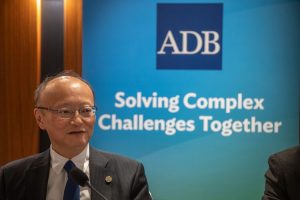 Asian Development Bank President Masato Kanda to Visit Tajikistan in March
Asian Development Bank President Masato Kanda to Visit Tajikistan in March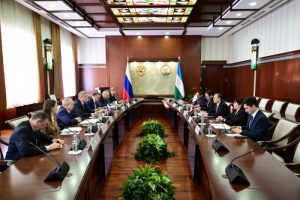 Tajikistan, Bashkortostan Officials Discuss Expanding Interregional Cooperation
Tajikistan, Bashkortostan Officials Discuss Expanding Interregional Cooperation Tajikistan, Azerbaijan Discuss Strengthening TV and Radio Cooperation
Tajikistan, Azerbaijan Discuss Strengthening TV and Radio Cooperation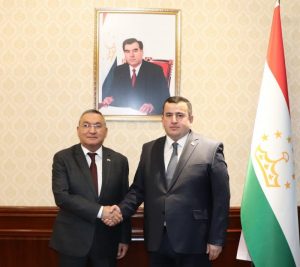 Tajikistan, Kazakhstan Discuss Expanding Economic and Trade Cooperation
Tajikistan, Kazakhstan Discuss Expanding Economic and Trade Cooperation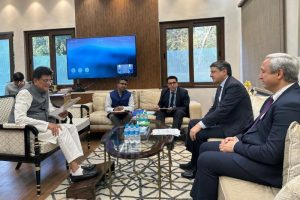 Tajikistan and India Discuss Expanding Industrial and Technology Cooperation in New Delhi
Tajikistan and India Discuss Expanding Industrial and Technology Cooperation in New Delhi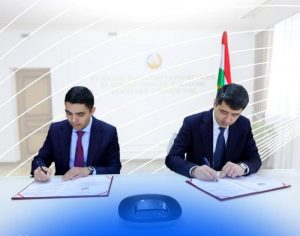 Tajikistan to Modernize Postal Services through Automation Project
Tajikistan to Modernize Postal Services through Automation Project














